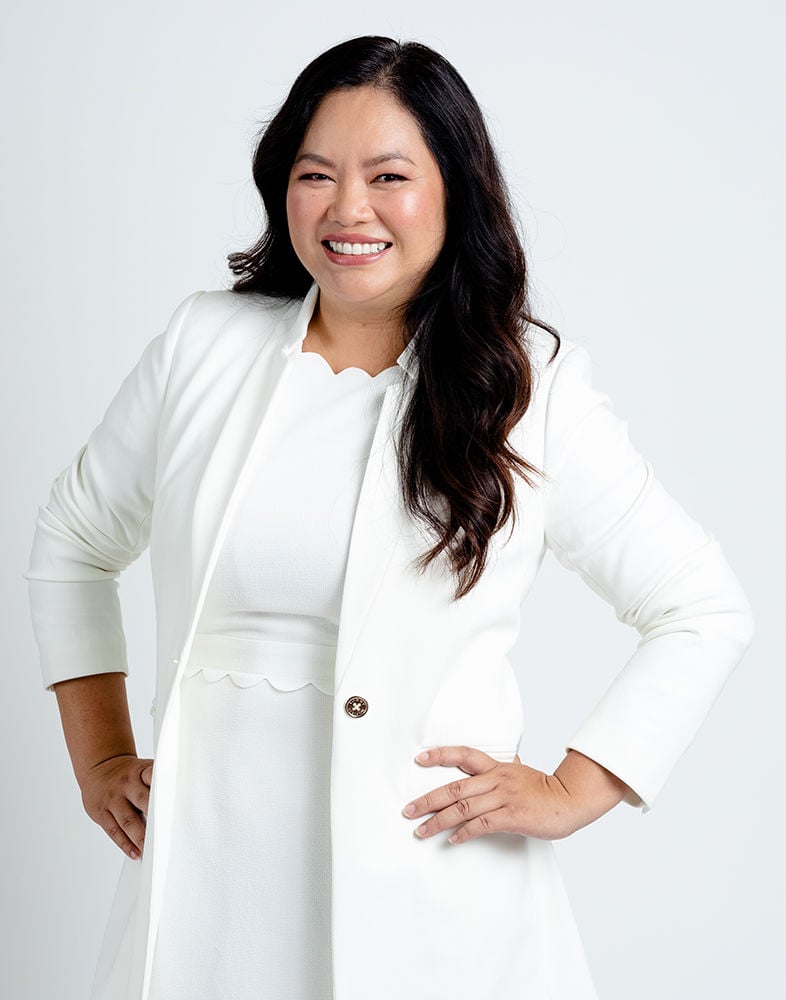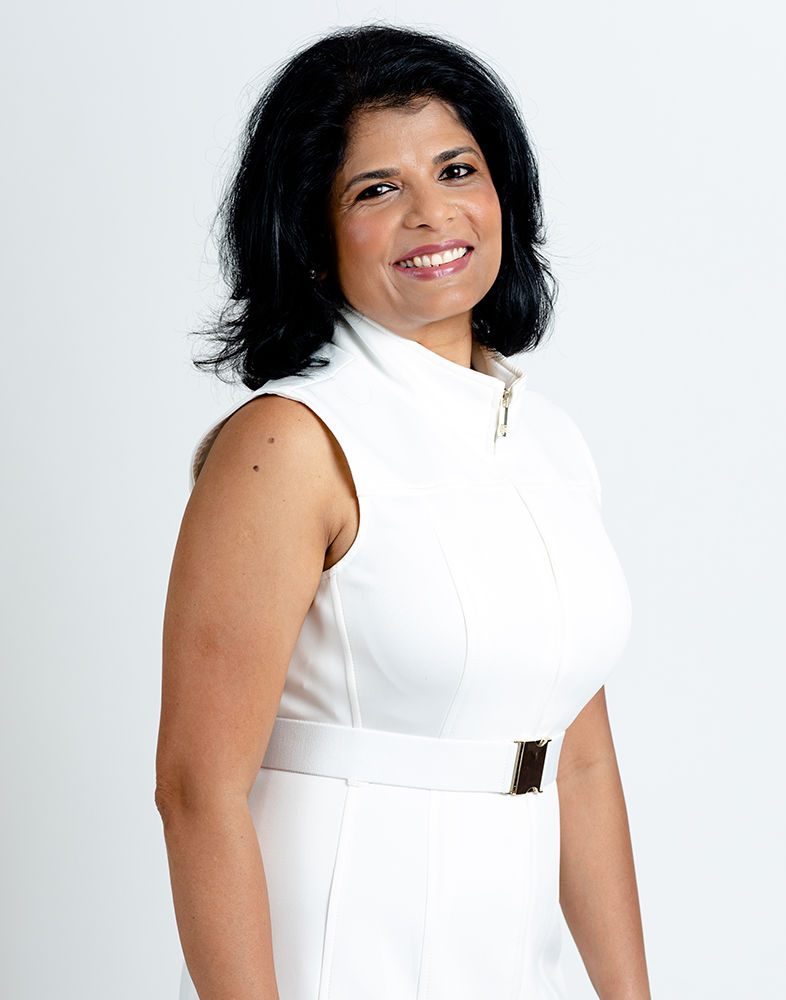
What San Diego Women Want
In 2018, women graduate from college in greater numbers than men, and we account for just as many entry-level hires—with pretty equal salaries. But mid-career, around the time that many women start families and/or could pursue upper management roles, we stall. On average, our numbers fall off—the number of hours we continue to put in, the number of dollars we get paid, and the number of us represented in the board room.
There’s even some confusion tangled up in the terminology. For example, a company might compensate workers equally for the same jobs (pay equity). But if most of the executive positions are filled by men, there’s likely still a gender pay gap (which compares the average of men’s salaries to the average of women’s). So women need to fill more leadership positions. And to get there, we need mentoring, executive coaching, helpful networks, and respect in the workplace. To stay there, many require flexible schedules and higher salaries to afford help at home.
Promoting women is an investment with a great return: Studies show that companies perform better when they have women calling the shots. We interviewed dozens of successful women about their rise to the top, how they got there, and what still needs to change.
Choose a Topic
Real Women, Real Advice
In the Boardroom
On having a seat at the table…
“At my last company, I was invited to the board meetings. The entire board was significantly older men. I was quiet and newer to the company. They’d bring the food in those meetings, and before I knew it, I was passing out food and people would wait for me to do it. I realized one day that passing out food is certainly not going to help me become a powerful player in the room.
So, when the food would come to the table, I would leave the room and give them time to sort it out themselves; and then when I came in I might not have had my first choice of entrées, but I was no longer the person who immediately fell into the secretarial/maternal mode. It was a very deliberate decision I made to make sure I was equal to everyone else, even if I was younger and the only woman. Eventually I gained a lot of influence and would often participate or lead those meetings.
Now, if I observe that type of [serving] behavior, I will quietly pull them aside and point it out or ask a man to go serve, because now I’m in a position where I can control the room a little more. Those cues matter.”
—Lynn Herrick, General Counsel, Chief Human Resources Officer and Corporate Secretary, GreatCall

What San Diego Women Want
Illustration by Verónica Grech
On being skipped over…
“If somebody else had a PhD and an MBA at 29 and was starting a company, I would have thought they were ambitious and successful. I was hearing things like ‘Oh, sweetheart, who’s going to run the company for you?’ Um, excuse me? When I was the CEO [of Cypher Genomics, which she sold to Human Longevity], you shake hands at the beginning of a meeting, and I would be skipped over because they thought I was an assistant or didn’t know what I was doing there. It was super frustrating. I think a lot of it is totally unconscious bias. I filed it away, a kind of motivation like, ‘I’m going to show you that you’re 100 percent wrong about your assumptions and you’re going to wish you had a chance to invest in my company.’”
—Ashley Van Zeeland, President, Yara Bioscience
On becoming a leader…
“The advice I would give a young leader is to be vulnerable. You don’t have to know everything. Being inclusive and asking for people’s opinions and ideas is not a sign of weakness; it’s a sign that you know how to empower your team. I also believe that’s a big difference between men and women. As you sit in a leadership meeting, men have no problem asking questions or challenging. Women start their sentences with ‘I hear you, I understand.’ A man comes off as just talking to get to the bottom of something. It’s not fair, but it’s the reality.”
—Sarah Jennings, Vice President of Sales, Classy
On gaining credibility…
“HR is by far the function where you have the most female representation. Over 60 percent of HR executives are women. That doesn’t mean you have respect at the table at the C level. Early on, at previous organizations, I had to get over that I was the only woman. I had to learn the strategic aspect of my role, to move on from—not necessarily an emotional place, but a soft place, and a ‘people perspective’ only. That meant positioning my function with the group: here are my recommendations, here’s how it’s going to drive the business, here are the tactics to do that, and then demonstrating success and providing metrics along the way. That’s what I had to learn to gain credibility. You have to connect it to the business. Otherwise, it’s a great idea, but how does it drive the business?”
—Sheryl Roland, Vice President of Human Resources, SmartDrive
Real Women, Real Advice
Compensation
On discovering my worth…
“In 2005, I was sitting at a bar in New York with one of my biggest advocates and mentors. He pulled out his pay stub and showed it to me. The check was for mostly the whole year. It was far more than what I was making. It was far more than I thought even possible. I remember when I later hit that amount. I’m not sure I would have asked for raises or promotions if he hadn’t shared that pay stub with me. Often women are not in these conversations about what’s possible. We need to talk about money more and help women know what is possible.”
—DeAnne Steele, Managing Director, U.S. Trust
On taking time off—and being audited for it…
“I had taken three weeks off of work to get married and embrace a two-week honeymoon with my new husband. I worked extremely hard for over a year to be able to take this time off worry-free.
Little did I know, while I was away my company put my business through an audit to ensure that I really was capable of such success. It was not until I returned that my boss told me what happened, and how they thoroughly investigated my work prior to paying me.
Working very hard and with integrity in order to take the time off and earn a hefty paycheck was something I was very proud of. However, knowing I was doubted really discouraged me and made me feel less valuable than I thought I was to my company. It was humbling. It taught me to never get too confident but to still be grateful for my individual accomplishments.”
—Lara Schulte, CoFounder, Generation.Mom
On when to ask for a promotion…
“Don’t ask for a promotion until you’ve completed a professional development plan. This should be a living document you update regularly with your supervisor and mentor, detailing what gaps to close and milestones to achieve for your next promotion. You must advocate on your own behalf to have continuous professional growth, and it is your responsibility—not your manager’s—to vouch for your progression. Generally speaking, you are promoted when the company requires the role and/or you are already performing at a higher level. Don’t be shy about your ambitions. Ask what the company growth plans require and what you need to accomplish to move up.”
—Dawn Barry, Cofounder and President, Luna DNA
On negotiating a raise…
“As a young manager, I realized I was underpaid and making less than my male counterparts and junior male colleagues. I approached my manager with my résumé and asked him a few questions, including ‘Do you think I’m underpaid?’ and ‘Do you think I’m an A player, or should I take the calls from the competition?’ I negotiated my way to a fair salary and compensation.”
—Dana Alligood, Southern California Market Executive, Bank of America
On asking for pay parity…
“After working at Illumina for 10 years, I decided to stand up for myself and ask my manager to do an adjustment in salary if there was any difference between my peers and myself. It was one of the hardest things I have ever done. Before having the discussion, I practiced what I wanted to say multiple times in front of the mirror. I was surprised: He accepted my request and thanked me for knowing it was my career and if I didn’t care about it, no one would.”
—Ida Khodami, Associate Director of Global Operations, Illumina
Real Women, Real Advice
Communication
On demanding respect…
“Everyone is coming from a different place; sometimes it’s not from your perspective, and that’s where conflicts or challenges happen. I’ve had team members, both men and women, who have never reported to a woman before. They approach me differently than they would a male supervisor. As women, we shouldn’t be expected to tolerate that kind of behavior. If someone comes and says something disrespectful or rude, would that person ever say that if their supervisor were a man? That tone would never come across. And I’ve had to call them out and say, ‘Look, at the end of the day, the buck stops with me. I’m the supervisor, this is my project, and you need to approach me differently.’ It’s not always easy. Everyone has a story, a background; sometimes we need to put ourselves in their shoes. The more you try to understand their position or reaction, the easier it becomes to deal with the stress. Every time I’ve stepped back and said, ‘What is really going on here?’ I’m able to find a resolution. People like to get into the weeds of what their work is, their contribution is, and make it all about them. And you have to yank them back and really address the issue. It’s not a personal thing. They’ll take you giving constructive criticism as saying they’re not competent in their job. I would say, ‘No, it’s not about competency, it’s about being more diligent about your work.’ For me, it’s separating what’s personal about the situation and what’s the real issue.”
—Susie Harborth, Chief Operating Officer, BioLabs

What San Diego Women Want
Susie Harborth | Photo: Flavio Scorsato
On finding my voice…
“I finished my undergraduate and master’s degrees from MIT in an accelerated way, and at 22, was the youngest-ever product manager at my company. Being female and young, I was always shy about asking for a raise, asking for a better project, asking to be involved in the next big things, etc. My sister told me that doing excellent work is not enough; to get ahead you need to speak up and ask for what you want. This was not easy for a shy 22-year-old, but I decided to take her advice. I promised myself that every meeting I went to, I would speak up at least once. I immediately saw positive results and impact. I started asking for more growth opportunities, and my lightbulb moment was when a manager told me ‘Oh … I never knew you would be interested,’ and then put me on the project.
I got to be the product lead for the HiSeq X Ten because I was persistent in asking to get involved in launching a product in the sequencing market. The launch of the HiSeq X Ten system was the most successful in the history of Illumina. It can sequence up to 16 human whole genomes in less than three days at a cost of $1,000 per genome; compare this to 2003, when it took 13 years to sequence one human genome and cost about $2.7 billion! That’s 1,581 times faster and 2,700 times cheaper.”
—Pantea Khodami, Senior Market Development Manager, Illumina
On not being intimidated…
“All I wanted was to help alcoholics and addicts find a new way of life. In the ’70s Dr. Tom Rusk wanted to hire me to advocate for drug-free workplace policies to companies. Initially, I told him I didn’t think the San Diego business world was ready for a woman to do that kind of work, and he might want to look at having a man do it instead. This was 45 years ago, and San Diego business was still very much a man’s world (as was the rest of the country). The minute I got in my car to drive away from that meeting, I thought, ‘Why did I turn that job down?’ I wrote him a letter that he still has to this day: ‘Dear Dr. Rusk, I must have been out of my head, because I am the only person who can do that job for you, so I would like to re-interview with you.’ He graciously interviewed me again, and I went to work for him for about five years.
I later formed a nonprofit corporation to meet the needs of people with substance abuse disorders. We now serve 11,000 individuals a year. Can you imagine? If I hadn’t stopped myself from being intimidated, we wouldn’t be serving all those clients who need us today!”
—Jeanne McAlister, Founder and CEO of McAlister Institute
On body language…
“I’ve been working with an executive coach for the last two years. Early on in my career I got feedback on how I came across at meetings, and it wasn’t necessarily the words I was choosing, it was the tone I was using. It was the body posture. So I will very rarely cross my arms in any situation—it comes across as combative, rather than open. I’m constantly sitting in meetings with my hands by my side or on the table; I’m very, very aware of where my hands are, as well as my facial expressions. When I start to feel myself get defensive about something, I have to be very conscious of the tone of my voice, to make sure that I’m coming across as truly wanting to solve the issue and not taking it personally.”
—Sarah Jennings, Vice President of Sales, Classy
On learning to call the shots…
“When I first started working for myself, I had to gain the confidence to distinguish the nuances of working for my clients as opposed to working with my clients. I wanted to establish a four-day in-office workweek, but was nervous clients might not feel confident about this. I gradually came to the realization that this was not something I needed to ask for—it was something I needed to set forth as the head of my own firm. I sent an email letting clients know this was the new procedure, and although I was not physically in-office on Fridays, I was still available and all time-sensitive matters would be handled.”
—GG Benitez, CEO, GG Benitez & Associates Public Relations
Real Women, Real Advice
Motherhood
On being a pregnant CEO…
“I was pregnant raising money for [Cypher Genomics], and I’d hear, ‘Jeez, do you really think you’re going to come back?’ A male CEO, they have kids all the time. I guarantee they’re not asked, ‘Are you going to come back after the birth of your child?’ I was surprised they were asking that. The company was my first baby. I willed that thing into existence, so ‘Nah, I’m good now’ was never a thought in my head.”
—Ashley Van Zeeland, President, Yara Bioscience
On pumping at work…
“I’ve pumped in filthy bathrooms, dirty closets, and in cars on the way to meetings. Not exactly the most sanitary way to prepare your newborn’s food. When the PR firm I worked for moved to a newly built coworking space, Moniker Commons, we asked the owners to make a space for pumping. And they did! They built out an unused closet and created a nursing lounge with a recliner, table, privacy sign, and electrical power. I was able to have privacy in a clean space outside of a bathroom, and it helped me pump efficiently so I could get back to my desk. You never know until you ask, and I’m proud that future women will have a space to pump for their babies.
Don’t eschew motherhood in the workplace. Too often we’re made to feel that we have to pretend we don’t have kids so we aren’t discriminated against. If anything, being a working mother means we are capable of more. We multitask like nobody’s business, and we have zero time to slack off.”
—Kelly Brown, Founder, Kelly Public Relations
On offering to step down…
“I took a big risk when I asked the board of directors for flexible work hours once my youngest child was born. As the CEO, I recognized this may not be workable for the company, but I also knew I couldn’t care for my new baby in the current work situation. I offered to stay on as CEO, transition to another position, or to resign if that was best for the company. My oldest child had special needs, so in order to adequately care for him and a newborn, I needed to reduce my hours. The organization already offered a variety of working arrangements for parents, but I recognized that the role of CEO was different from other positions. I wanted very much for the organization to succeed—something that was more important than my desire to remain on as CEO—so I felt very much at peace about my decision. After a brief deliberation, the board approved my request. I was gratified to be so valued and trusted by the board of directors.”
—Michaelene Fredenburg, President and CEO, Life Perspectives

What San Diego Women Want
Illustration by Verónica Grech
On asking for help…
“When I was starting out, I wish I had known I should focus on doing what only I could do. Only I could lead my business and be a mom to my kids. But lots of other people could do administrative work, housework, etc. I should have outsourced sooner. My other piece of advice for working mothers is to figure out what your minimum effective dose of self-care is and make that happen every day.”
—Lisa Druxman, Founder, Fit4Mom
On being resilient…
“Running an initial public offering during the San Diego wildfires with a husband at sea and a child with a newly diagnosed medical condition just about crushed me. I was reminded of the quote by Reed Markham, former speechwriter for the Supreme Court: ‘Successful leaders see the opportunities in every difficulty rather than the difficulty in every opportunity.’”
—Julie Ames, Vice President of Corporate Communications, Biocom
On the motherhood gap in employment…
“After taking over five years off to be a stay-at-home mom, I decided to freshen up my résumé and go back to work as a business systems analyst. I got lots of attention from recruiters at first, then they would go cold when they saw I had been out of the workforce for several years. Ultimately that gap in employment was the reason I didn’t make it past the first interview phase. It was both a surprise and very frustrating! I was definitely thinking I should have gone back sooner.
After months of this, I decided to embrace my inner entrepreneur and launch a business I was passionate about. Looking back, I realize I wouldn’t have pursued my dreams if I’d gone back to working full-time for someone else.”
—Suni Gargaro, Founder and Designer, Sunia Yoga
On rewriting parental leave…
“Since I have my own business, I have to ask myself what I need, as well as communicate that with all my business partners and team members. When I went back to work after having my third daughter, I decided how much maternity leave I would need to recover and made sure everyone else on my team was okay with it. I’m grateful to be part of a business that’s taking a stand with paid family leave, which includes 12 weeks of fully paid leave for moms, dads, and adoptive parents, and up to six additional weeks paid for recovering from childbirth. I want every mom and dad to feel comfortable with that transition from the home back to the office.”
—Cassandra Curtis, Cofounder and Chief Innovation Officer, Once Upon a Farm
Real Women, Real Advice
Culture
On becoming my own boss…
“I had a high school counselor tell me retail was in my blood. I went into the Gap retail management training program and worked for them for almost eight years in nearly every product category, deciding what’s going in stores. It bred a foundation for understanding consumer trends and the marketplace and doing that at a large scale. Right when I moved to San Francisco I started noticing changes in my body—losing hair, cystic acne, I’d cry on the bus to work for no apparent reason. No doctor could tell me what was going on. On my downtime at work, I was reading wellness blogs. I was attending wellness networking events versus those of the industry I was in. I started thinking, ‘Has this experience awakened this newfound calling?’ And the answer was yes. I enrolled in the Institute of Integrative Nutrition remotely. My husband had an incredible job waiting for him here. We took the leap.
That’s when I decided to launch [the website] Good Life—working one on one with women on their wellness goals. I coached women on how to find accessibility, ease, and fun in living well. It was so rewarding, and I was consistently making product recommendations. But I’m like, “Why am I sending them to Amazon? I know how to do this! I’ve been in retail for 14 years!’
I launched a shop encouraging women to come in and relate with each other. It’s a way for them to connect and share their health journey and have a hug or a tear over it. That is unlike anything I’ve experienced through the digital world. It’s hard to offer that connection on an online platform. It’s my favorite part of owning a brick and mortar.”
—Leah Kirpalani, Founder and Owner, Shop Good Beauty Boutique

What San Diego Women Want
Leah Kirpalani | Photo: Flavio Scorsato
On being candid with the boss…
“In one of my first jobs I was one of very few females with an all-male management structure. It was hard to participate in the water cooler chat that was centered on football and ‘guy movie’ quotes. When I tried to participate it was awkward for all of us. Up until that point I had turned a blind eye to gender differences. But comments like ‘You probably never want kids, right?’ started to sting. I decided to share with my manager that I felt isolated and the diversity I brought was not appreciated. As I did, my eyes started to water up and to my surprise, so did his. He just looked at me and said, ‘I am so sorry; please tell me what I can do to help. I want to support you.’ In this moment I realized men need to be part of the solution and men want to be part of the solution.”
—Aboli Rane, Senior Regional Segment Manager, Illumina
On not speaking their language…
“It felt like I always had to work harder than the guys. The decision-makers are men, and they like their buddies. I always felt at a disadvantage because I don’t talk sports. They have a natural connection to each other. Few general managers of hotels are women. I worked at a hotel chain that only averaged about 8 percent female GMs over the course of my 20-plus years with the company.”
—Mairead Hennessy, General Manager, Estancia La Jolla Hotel & Spa
On rewriting norms…
“The first day I showed up at work, all the mothers were abuzz that the new head of school had car seats. For 130 years, the prior leaders were always religious sisters who lived on campus and did not have children or husbands to balance. With three little ones, I find that the community and I are constantly rewriting new norms to accommodate a new chapter for OLP where a woman who is married, and has children, is now leading the school.
Although many times we think of education as a female-friendly work environment, it is not nearly as common for a young woman to be leading a secondary school. I remember when I became principal [at my alma mater in Northern California], I was pregnant at the time, and I received many questions about how I was going to handle running a school of over 1,200 students while caring for an infant. Even after my third pregnancy while serving at OLP, the questions still kept coming! It’s still a shock to many, to see a woman with young children as a top executive. Breaking barriers is really about creating a new norm, a new model, that others can follow.”
—Lauren Lek, Head of School, Academy of Our Lady of Peace
On male versus female entrepreneurs…
“The students in my entrepreneurship classes are about 60 percent men, 40 percent women. The women are more likely to come up with ideas that are not just profit-driven but also help society. Women are more likely to think, ‘If this business started up, what are the changes I’m bringing to the customer and the people involved?’ Men are more likely to focus on a novel idea and less likely to think about the social and community aspects of it. Men are more interested in doing something others haven’t done before. There are exceptions, but in general that’s what I observe.”
—Congcong Zheng, Associate Professor of Entrepreneurship, Fowler College of Business at San Diego State University
On shifting the paradigm…
“I have some amazing women executive friends. We were having a conversation and I brought up the fact that Salesforce just created gender equity for hundreds of thousands of employees nationally, to the tune of $3 million. We were saying how long all of us knew about pay inequity. Many of these people are HR execs and, of course, they see what people are getting paid. One said, ‘When they made me a VP, I knew I was getting paid 70 percent of all the other VPs in the organization, but I was so grateful to be within the executive ranks that I wasn’t about to make waves.’ It’s a hard-won privilege to be recognized in that way. And it’s not instant, like, ‘Now I’m in power like everybody else.’ It’s, ‘Now I really have to prove that I’m equal to everybody else.’ There wasn’t one of us who hadn’t had that feeling. But you’ve earned this, girl, you’ve got this, and you deserve to earn what any other executive would doing what you do.”
—Susan Penn, Founder and CEO, Reinventure Coaching and Consulting

What San Diego Women Want
Illustration by Verónica Grech
Real Women, Real Advice
Professional Development
On finding mentors…
“Find as many male mentors as you find female mentors. It’s traditionally their game, so if you want to play you need to learn from the people who have played it well and who understand the rules.
I have what I like to call my own board of directors, which are people that I’ve either worked for in the past or met through an organization or event. They’re not in my current work environment, so I can be honest with them. I tap into them a lot—some every three to six months—and some are on my favorites list on my phone. Even from a young age, you should have that. It’s a secret weapon. Tap into people and their expertise.”
—Lynn Herrick, General Counsel, Chief Human Resources Officer, and Corporate Secretary, GreatCall
On embracing ambition…
“To feel valued or worthwhile—and this is well documented—women feel they have to be masters at what they do. They spend all their time and energy on mastering a particular software or service. What happens is, they do it to the detriment of building a network, and for those that do, they’re so reticent to leverage that network and build the allies, coalition, and ecosystem that allow women to climb. You’re so focused on your job, you lose sight of your career. You wonder why it’s been 15 years and you haven’t gotten anywhere? You’re irreplaceable. We have to stop being tacticians and be strategic in how we show up in our jobs, our careers, and our society.
If being a strong self-advocate is too much to swallow, if that image doesn’t sit with your worldview, then I want you to put your kids and your community on the other side of the ledger and think about society. By you not pursuing things in an ambitious way, you’re not as capable to serve your family, community, and society. It has to be about something other than your self-image. If we’re so attached to our self-image that ambition can’t be a part of how we see ourselves, then we need to change the way we view the motivation for ambition, which is to help others, not necessarily ourselves.”
—Holly Smithson, CEO, Athena
On asking for criticism…
“Late in 2015, after 10 years of working with my boss, he challenged me to rise to the next level. What did I foresee in my career? Where did I want to go? I told him: vice president. And he said, ‘You’re right, I see that potential in you.’ He made it very clear to me there was a path moving forward, but I had to make it happen. I put a plan in place. Part of that plan was for me to take on additional leadership roles within COI and the life sciences community. I put a committee together to rate me and my skills: Two VPs from public companies interviewed members of our senior staff. The investigative work went on for about six months. I wanted this to be no-holds-barred. If I was not deserving of it, then I can take that. But I was going to do everything I could so that I was deserving of this promotion. I achieved my promotion to VP of HR and Admin in late 2016, a year later.”
—Fran Senchak, Vice President, Human Resources and Administration, COI Pharmaceuticals

What San Diego Women Want
Reema Poddar | Photo: Flavio Scorsato
On how I got into STEM and am getting others into it…
“Growing up, I never thought I would be a computer science engineer. My passion was to become a doctor, because in second grade, my dad had five heart attacks in one day. I made up my mind: I’m going to be a cardiologist. I will save the world and no one will ever go through what we are going through. The first time I touched a computer was when I was in grad school in Bangalore. The way that technology has transformed from then to now, I’ve been able to touch more patients with the software and technology I built at General Electric than I would have if I’d been a cardiologist.
You see a lot of women pursuing technology degrees, but then they drop it because they don’t understand how you can apply this. If you don’t share the story of how technology changes the world, you’re really not creating an interest in the area. GE Girls was a big initiative I started. We’d go to middle and high schools and bring them to the company for mini courses. I wish I could’ve done it when I was girl! We show them it’s not just about coding; there are several aspects. How do you listen to the customer? You need the skills of empathy; if you’re a good writer you capture the story and then you work with the engineers to break it down. So at GE, with that concept we came up with the idea of hiring 20,000 female technologists by 2020—not just engineering, but sales, marketing, product management, and testing. And they’re on track to get there.
At Teradata we have a mentorship program called Terabytes. It also provides a social network with activities and opportunities for learning and building relationships, and they also see how we are investing in them.”
—Reema Poddar, Senior Vice President of Product Development, Teradata Corporation














